Blog
Items filtered by date: August 2025
Caring for Diabetic Foot Wounds
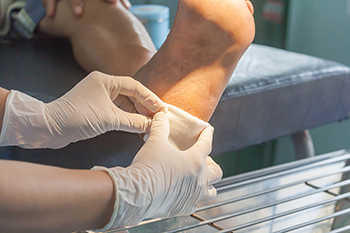
Diabetic foot wounds can develop when nerve damage causes people to miss signs of pressure, cuts, or irritation on their feet. Poor circulation makes it harder for these wounds to heal, which increases the risk of infection. Wounds often appear on the toes, soles, or heels, especially in spots where shoes rub or pressure builds up from calluses or foot deformities. Because many people with diabetes do not feel pain in their feet, these wounds may go unnoticed and become worse, over time. A podiatrist can examine the wound, check blood flow, test for nerve damage, and provide care to prevent further injury. They can also help reduce pressure on the wound by recommending special footwear or in some cases, surgery. Without proper care, diabetic foot wounds can lead to serious infections and tissue or limb loss. If you notice foot or lower leg wounds that are not healing properly, it is suggested that you schedule an appointment with a podiatrist for safe and effective wound care.
Wound care is an important part in dealing with diabetes. If you have diabetes and a foot wound or would like more information about wound care for diabetics, consult with Christian Smith, DPM from UTOEpia Foot and Ankle Specialist. Our doctor will assess your condition and provide you with quality foot and ankle treatment.
What Is Wound Care?
Wound care is the practice of taking proper care of a wound. This can range from the smallest to the largest of wounds. While everyone can benefit from proper wound care, it is much more important for diabetics. Diabetics often suffer from poor blood circulation which causes wounds to heal much slower than they would in a non-diabetic.
What Is the Importance of Wound Care?
While it may not seem apparent with small ulcers on the foot, for diabetics, any size ulcer can become infected. Diabetics often also suffer from neuropathy, or nerve loss. This means they might not even feel when they have an ulcer on their foot. If the wound becomes severely infected, amputation may be necessary. Therefore, it is of the upmost importance to properly care for any and all foot wounds.
How to Care for Wounds
The best way to care for foot wounds is to prevent them. For diabetics, this means daily inspections of the feet for any signs of abnormalities or ulcers. It is also recommended to see a podiatrist several times a year for a foot inspection. If you do have an ulcer, run the wound under water to clear dirt from the wound; then apply antibiotic ointment to the wound and cover with a bandage. Bandages should be changed daily and keeping pressure off the wound is smart. It is advised to see a podiatrist, who can keep an eye on it.
If you have any questions please contact our office located in Memphis, TN . We offer the newest diagnostic and treatment technologies for all your foot and ankle needs.
Custom Orthotics For Ankle Stability

Step with assurance, thanks to enhanced ankle stability from orthotics! If you're active and on the move, Custom Orthotics are your ally for stronger, steadier ankles. They align your foot and ankle, reducing the risk of sprains and offering solid support for every stride. Don’t let instability hold you back. Try Custom Orthotics from our office, and discover unshakable confidence in every step!
Symptoms and Risk Factors for Athlete’s Foot
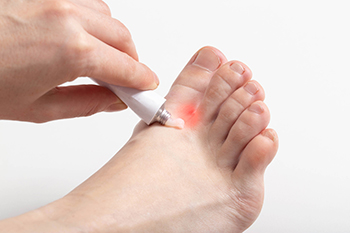
Athlete's foot is a fungal infection that affects the feet, particularly the soles and the spaces between the toes. Symptoms include scaling, which can vary from mild redness and itching, to severe cracking and painful blisters. As the athlete's foot infection progresses, the skin may become thickened, and, in some cases, it can lead to bacterial infections, especially in older adults or those with poor circulation. The fungus thrives in moist, warm environments, such as communal showers or areas where individuals walk barefoot. Wearing tight shoes can also increase the risk. Diagnosis is typically made through a visual examination, though a skin scraping may be taken for further analysis, if needed. A podiatrist can provide effective treatment with antifungal medications applied to the affected area or taken orally in more severe cases. If you have a stubborn athlete's foot infection, it is suggested that you schedule an appointment with a podiatrist for advanced treatment.
Athlete’s Foot
Athlete’s foot is often an uncomfortable condition to experience. Thankfully, podiatrists specialize in treating athlete’s foot and offer the best treatment options. If you have any questions about athlete’s foot, consult with Christian Smith, DPM from UTOEpia Foot and Ankle Specialist. Our doctor will assess your condition and provide you with quality treatment.
What Is Athlete’s Foot?
Tinea pedis, more commonly known as athlete’s foot, is a non-serious and common fungal infection of the foot. Athlete’s foot is contagious and can be contracted by touching someone who has it or infected surfaces. The most common places contaminated by it are public showers, locker rooms, and swimming pools. Once contracted, it grows on feet that are left inside moist, dark, and warm shoes and socks.
Prevention
The most effective ways to prevent athlete’s foot include:
- Thoroughly washing and drying feet
- Avoid going barefoot in locker rooms and public showers
- Using shower shoes in public showers
- Wearing socks that allow the feet to breathe
- Changing socks and shoes frequently if you sweat a lot
Symptoms
Athlete’s foot initially occurs as a rash between the toes. However, if left undiagnosed, it can spread to the sides and bottom of the feet, toenails, and if touched by hand, the hands themselves. Symptoms include:
- Redness
- Burning
- Itching
- Scaly and peeling skin
Diagnosis and Treatment
Diagnosis is quick and easy. Skin samples will be taken and either viewed under a microscope or sent to a lab for testing. Sometimes, a podiatrist can diagnose it based on simply looking at it. Once confirmed, treatment options include oral and topical antifungal medications.
If you have any questions, please feel free to contact our office located in Memphis, TN . We offer the newest diagnostic and treatment technologies for all your foot care needs.
Relieving Plantar Fasciitis With Custom Foot Orthotics
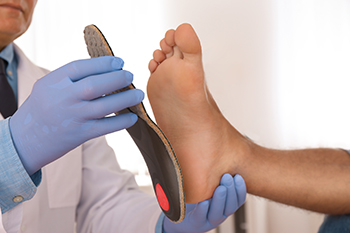
Plantar fasciitis is a common cause of heel pain, often resulting from strain on the thick band of tissue that supports the arch. This condition can make walking or standing uncomfortable, especially first thing in the morning. Foot orthotics help by supporting the arch, redistributing pressure, and absorbing shock during movement. They ease tension on the plantar fascia and promote healing. A podiatrist can assess your foot structure, confirm the diagnosis, and design custom orthotics tailored to your specific needs. With proper support, symptoms can improve and daily activities can become more comfortable. If you have developed heel pain, it is suggested that you visit a podiatrist to explore how orthotics can provide lasting relief and restore foot comfort.
If you are experiencing discomfort in your feet and would like to try custom orthotics, contact Christian Smith, DPM from UTOEpia Foot and Ankle Specialist. Our doctor can provide the care you need to keep you pain-free and on your feet.
What Are Custom Orthotics?
Custom orthotics are inserts you can place into your shoes to help with a variety of foot problems such as flat feet or foot pain. Orthotics provide relief and comfort for minor foot and heel pain.
Over-the-Counter Inserts
Shoe inserts come in a wide variety and are used to treat foot pain, heel pain, and minor problems. For example, arch supports can be inserted into your shoes to help correct overarched or flat feet, while gel insoles are often used because they provide comfort and relief from foot and heel pain by alleviating pressure.
Prescription Orthotics
If over-the-counter inserts don’t work for you or if you have a more severe foot concern, it is possible to have your podiatrist prescribe custom orthotics. These high-quality, custom inserts are designed to treat problems such as abnormal motion, plantar fasciitis, and severe forms of heel pain. They can even be used to help patients suffering from diabetes by treating foot ulcers and painful calluses and are usually molded to your feet individually, which allows them to provide full support and comfort.
If you're experiencing minor to severe foot or heel pain, it’s recommended to speak with your podiatrist about the possibility of using custom orthotics or shoe inserts. A podiatrist can determine which type of custom orthotic or shoe insert is right for you and help you take the first steps toward being pain-free.
If you have any questions, please feel free to contact our office located in Memphis, TN . We offer the newest diagnostic and treatment technologies for all your foot care needs.
Treating a Sprained Ankle
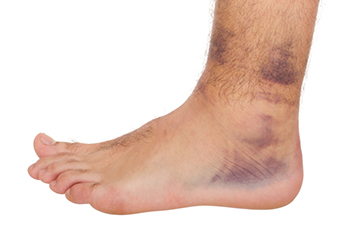
A sprained ankle happens when the ligaments that support the joint are stretched or torn, usually from a sudden twist or fall. This injury can cause pain, swelling, and a feeling of instability. It may be hard to walk or put weight on the affected foot. The level of damage can vary from a mild stretch to a complete tear. Early care makes a difference in how well and how quickly the ankle heals. Rest helps reduce swelling. Elevating the ankle and avoiding weight-bearing activities can prevent further damage. Supportive wraps or braces may be helpful, and trying to walk too soon can delay healing. If your ankle remains swollen or unstable, it is suggested you schedule an appointment with a podiatrist for a full evaluation and appropriate treatment.
Although ankle sprains are common, they aren’t always minor injuries. If you need your ankle injury looked at, contact Christian Smith, DPM from UTOEpia Foot and Ankle Specialist. Our doctor can provide the care you need to keep you pain-free and on your feet.
How Does an Ankle Sprain Occur?
Ankle sprains are the result of a tear in the ligaments within the ankle. These injuries may happen when you make a rapid shifting movement while your foot is planted. A less common way to sprain your ankle is when your ankle rolls inward while your foot turns outward.
What Are the Symptoms?
- Pain at the sight of the tear
- Bruising/Swelling
- Ankle area is tender to touch
- In severe cases, may hear/feel something tear
- Skin discoloration
Preventing a Sprain
- Wearing appropriate shoes for the occasion
- Stretching before exercises and sports
- Knowing your limits
Treatment of a Sprain
In many cases, the RICE method (Rest, Ice, Compression, and Elevate) is used to treat ankle sprains. However, you should see a podiatrist to see which treatment option would work best with your injury. In severe cases, surgery may be required.
It is important to ask your doctor about rehab options after you receive treatment for your injury. Stretching, strength training, and balance exercises may help the ankle heal while also preventing further injury.
If you have any questions, please feel free to contact our office located in Memphis, TN . We offer the newest diagnostic and treatment technologies for all your foot care needs.
Everyday Foot Care Tips for Healthy Feet
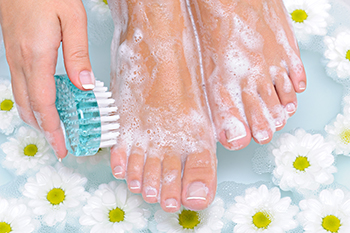
Maintaining proper foot hygiene is essential for overall health and mobility. Daily foot care includes trimming toenails straight across to prevent ingrown nails, keeping feet clean and thoroughly dry to avoid fungal infections, and checking for cracks, sores, or color changes that may indicate underlying issues. Wearing shoes that fit correctly helps prevent blisters, corns, and structural foot problems. A podiatrist can offer professional care, guidance on proper footwear, and early treatment for any emerging conditions. If you notice discomfort, changes in your feet, or have difficulty managing daily foot care, it is suggested that you consult a podiatrist. This type of doctor can treat various foot conditions, and guide you on effective every day foot care tips.
Everyday foot care is very important to prevent infection and other foot ailments. If you need your feet checked, contact Christian Smith, DPM from UTOEpia Foot and Ankle Specialist. Our doctor can provide the care you need to keep you pain-free and on your feet.
Everyday Foot Care
Often, people take care of their bodies, face and hair more so than they do for their feet. But the feet are a very important aspect of our bodies, and one that we should pay more attention to. Without our feet, we would not be able to perform most daily tasks.
It is best to check your feet regularly to make sure there are no new bruises or cuts that you may not have noticed before. For dry feet, moisturizer can easily be a remedy and can be applied as often as necessary to the affected areas. Wearing shoes that fit well can also help you maintain good foot health, as well as making it easier to walk and do daily activities without the stress or pain of ill-fitting shoes, high heels, or even flip flops. Wearing clean socks with closed shoes is important to ensure that sweat and bacteria do not accumulate within the shoe. Clean socks help to prevent Athlete’s foot, fungi problems, bad odors, and can absorb sweat.
If you have any questions, please feel free to contact our office located in Memphis, TN . We offer the newest diagnostic and treatment technologies for all your foot care needs.

